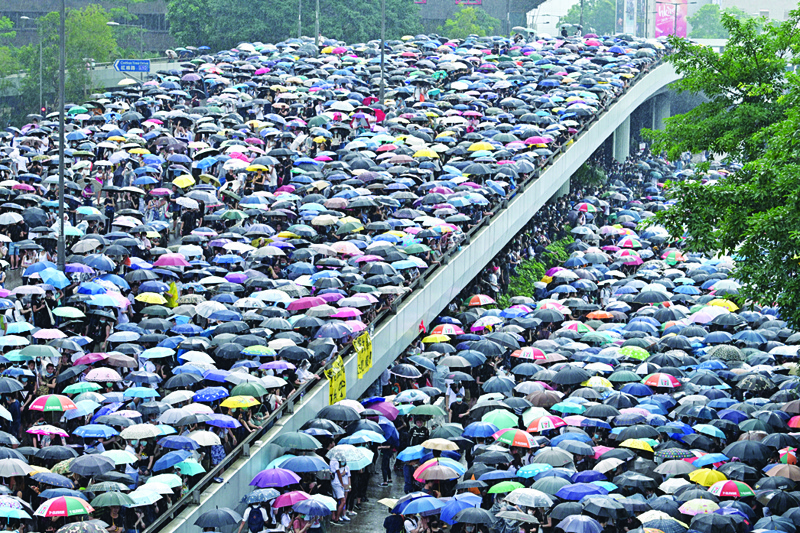 HONG KONG: In this file photo taken on June 12, 2019, protesters shelter under umbrellas during a downpour as they occupy roads near the government headquarters in Hong Kong. - AFP
HONG KONG: In this file photo taken on June 12, 2019, protesters shelter under umbrellas during a downpour as they occupy roads near the government headquarters in Hong Kong. - AFPHONG KONG: China's national security law for Hong Kong has shaken the city's legal foundations in the year since it was imposed, lawyers say, with court decisions and sweeping new powers for prosecution fuelling concerns about rights and the rule of law. Unlike the Communist Party-controlled courts in mainland China, Hong Kong has an internationally respected common law system that forms the bedrock of its reputation as a global financial hub.
Circumventing Hong Kong's own legislature, the security law was drafted in Beijing with the wording kept secret until it came into force on June 30 last year as authorities tightened controls after massive and often violent pro-democracy protests in 2019. In the year since the law was enacted, Hong Kong judges have declared that jury trials are not a constitutional right, and the presumption of bail is not guaranteed in national security cases.
"It's like an alien species invading our territory, an unstoppable sandstorm sweeping from the north," a defense lawyer told AFP. He was one of four defense counsels involved in ongoing national security cases that spoke to AFP, on condition of anonymity so they could speak freely. They alleged that Hong Kong courts now only "paid lip service" to rights when national security rules came up against longstanding protections in the city's own legal system.
Authorities have arrested 114 people under the security law, and 64 of them have been prosecuted. A watershed moment came last week, when the trial of the first person charged under the security law began without a jury and with three specially selected judges. Trial-by-jury has been a 176-year-old cornerstone of Hong Kong's common law system.
Constitutional law scholars have warned of the threat to the city's legal system, with courts trying to avoid irritating Chinese authorities, who hold final authority in security law cases. "When (the court) gives up a fundamental right without any rigorous scrutiny, it is also providing an intellectual rationalisation for a draconian regime," Johannes Chan, the University of Hong Kong's chair professor of public law, wrote in a journal article in May.
"If the judiciary is not vigorous and vigilant in protecting fundamental human rights, there would no longer be any rule of law." Hong Kong's judiciary declined to "comment on the legal or other substantive issues in individual cases", citing the principle of judicial independence. - AFP










